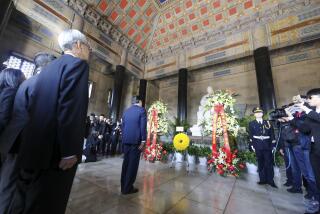Throng Pays Its Respects at Mao Memorial
- Share via
PEKING — A huge throng of people, some of them in organized groups, went to the Memorial Hall of Mao Tse-tung in downtown Peking on Tuesday to file past the encased body of the late leader on the 10th anniversary of his death.
Inside the hall, one of Mao’s daughters, Li Min, his son Mao Anqing and a daughter-in-law, Shao Hua, placed wreaths bearing the inscription “Carry Out Father’s Behests.” The words echoed a slogan used by supporters of Mao after his death in 1976: “Carry out Chairman Mao’s behests and carry the proletarian cause through to the end.”
Among those paying respects to Mao were his longtime personal bodyguard and security chief, Wang Dongxing, who organized the arrest of Mao’s wife, Jiang Qing, a month after Mao’s death. Wang, who was ousted last year from the Communist Party Central Committee, was escorted through the memorial hall as the crowds thinned out in mid-afternoon.
No Official Ceremony
The commemoration of Mao’s death took place even though the current leadership, headed by Deng Xiaoping, had let it be known that there would be no official ceremony to mark the occasion.
Chinese bookstores brought out new collections of Mao’s writings, a book on his reading habits and an English-language biography. A photo layout featuring the 1962 triumvirate of Mao, Premier Chou En-lai and Deng was published on the back pages of the People’s Daily, the party newspaper.
Otherwise, the day was officially treated as routine. The explanation was that China has decided to observe the anniversaries of the births of great leaders, rather than the dates of their deaths.
Line Stretches Into Square
Nevertheless, outside the Mao memorial, which was opened in public ceremonies on the first anniversary of Mao’s death, the crowd of people standing in line in mid-morning stretched into the middle of Tian An Men Square and back out around the hall to its southern flank.
“It’s the most people we’ve had in recent times,” said Li Zhengjie, a spokesman for the memorial hall. On normal summer days, as many as 40,000 people visit the hall, and the lines Tuesday were far longer.
The crowd included some tourists and Peking residents brought out by the fresh air and sunshine of Peking’s late summer weather. Others in the queue, however, acknowledged that they had decided to make a special visit because it was the anniversary of Mao’s death.
A plainly dressed man in his 60s, asked why he had come, gestured twice with a crooked index finger--the Chinese hand symbol for the number nine. The date of Mao’s death, Sept. 9, is the ninth day of the ninth month.
Came to Pay Respects
“We came here to pay the highest respects to Chairman Mao on this day,” the man’s companion said. “We were organized to come here by our unit.”
Both declined to identify themselves by name but said they were retired officials from the town of Xuzhou, in the coastal province of Jiangsu.
A peasant from the Peking suburb of Miyun said he had arranged a special trip to the memorial and nearby revolutionary museum to commemorate Mao’s death. Another man in line, a civil engineer from Anhui province who was in Peking on business, said that he too had decided to visit the memorial because of the anniversary.
Urged to Pass Quickly
The crowd was not unruly or demonstrative, although a few of those leaving the hall quietly wiped tears from their eyes. As usual, officials near the glass case containing Mao’s body exhorted visitors to pass by quickly, thus effectively discouraging any emotional display of grief.
Last month, an article in the Shanghai newspaper Liberation Daily said that stories about the historic importance of Chinese leaders should not be published without official permission. It also suggested that there should be a ban on activities commemorating the death of Chinese leaders.
In the days leading up to Tuesday’s anniversary, articles about Mao in the official press focused on his reading habits. “He never stopped reading, every kind of book, ancient and modern, Chinese and foreign, forgetting even food and sleep,” the People’s Daily said.
There was little mention of the viciously anti-intellectual Cultural Revolution in the final decade of Mao’s life. The new selection of Mao’s works that came out Tuesday begins with a 1921 speech and ends in 1965, just before the start of the Cultural Revolution. Some contain, on their title pages, calligraphy by Deng, who visited the memorial in December of 1983, on the 90th anniversary of Mao’s birth.
The official party verdict on Mao, given in 1981, is that he was a great leader who made “gross mistakes” in the final decade of his life.
That verdict was echoed in the English-language biography, entitled “Mao Tse-tung--Biography, Assessment, Reminiscences.” The work includes an essay by Deng criticizing Mao’s 1958 Great Leap Forward, in which millions of people died of starvation, and the persecutions of the Cultural Revolution.
More to Read
Sign up for Essential California
The most important California stories and recommendations in your inbox every morning.
You may occasionally receive promotional content from the Los Angeles Times.













